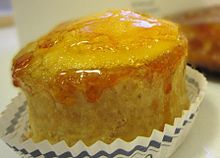Puits d'amour
 Puits d'amour | |
| Type | Pastry |
|---|---|
| Place of origin | France |
| Region or state | Paris |
| Created by | Vincent De La Chapelle |
| Main ingredients | Puff pastry, butter, confectioners' sugar, jam or jelly |
| Variations | Pastry cream stuffing |
The Puits d'amour (pronounced [pɥi damuʁ]) is a French pastry with a hollow center. The center is usually stuffed with redcurrant jelly or raspberry jam; a later variation replaced the jam with vanilla pastry cream. The surface of the cake is sprinkled with confectioners' sugar or covered with caramel.[1]
Etymology
Puits d'amour is a French expression carrying erotic connotations; it literally translates to 'well of love'.[2]
History
The first mention of the recipe appeared in Vincent De La Chapelle's 1735 recipe book Le cuisinier moderne (the modern cook). La Chapelle presented two recipes for a gâteau de puits d’amour (puits d'amour cake) consisting of a large puff pastry vol-au-vent topped with a pastry handle and stuffed with redcurrant jelly, the ensemble was meant to resemble the bucket of a well. The other recipe is for the petits puits d’amour (small puits d'amour), a bouchée sized variant of the cake.
In the eighteenth century, the puits d'amour caused scandal because of its name and presentation which alludes to the female genitalia; nevertheless it was very successful in the court of Louis XV's intimate dinners.[1][2]
Nicolas Stohrer, one of the exiled Polish king Stanislas pâtissiers preferred to stuff the dessert with vanilla pastry cream and glazed the top with a thick layer of caramel, removing the scandalous connotation of the red fruits jam filling.[1][2]
Preparation
A puits d'amour is made up of layers of staggered rings of puff pastry placed on top of a pastry circle. An egg yolk can be used to help the dough rings to stick together. The finished pastry "wells" are baked until puffed and golden-brown and set to cool. They are then sprinkled with powdered sugar, raspberry jam or redcurrant jelly which is carefully spooned in the hollow center.
In a later variation, the top is glazed with caramel icing and pastry cream is used as filling.[3][4]
See also
References
- ^ a b c "HISTORIQUE DU PUITS D'AMOUR". Les spécialités (in French). Stohrer. Retrieved April 1, 2013.
- ^ a b c "Il était une fois..." (in French). puitsdamour-biarritz.com. Archived from the original on April 11, 2013. Retrieved April 2, 2013.
- ^ "Puits d'Amour". cooking.com. Retrieved April 2, 2013.
- ^ "Puits d'amour à la confiture". Recettes. cuisine.larousse.fr. Retrieved April 3, 2013.
